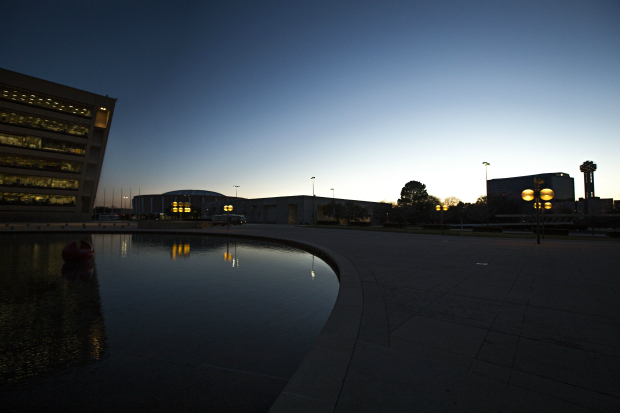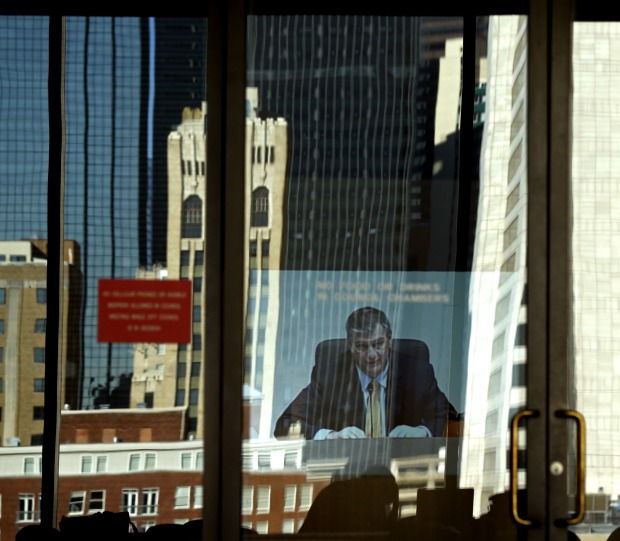
Mayor Mike Rawlings speaks at the announcement last April that the Commemorative Air Force planned to move its headquarters to Dallas Executive Airport. (Michael Ainsworth/DMN Staff Photographer)
The City Council approved a $700,000 grant Wednesday to help the Commemorative Air Force relocate its headquarters to Dallas Executive Airport.
But first, some council members offered words of praise and concern for the deal, the recipient and its future home.
Vonciel Jones Hill, who represents the airport area, and Tennell Atkins, a longtime airport supporter, hailed the CAF move, while downplaying some neighbors’ unease about aircraft noise.
“I live within walking distance of Dallas Executive Airport,” said Jones Hill, later claiming that “I and my neighbors have no complaints” about noise.
“I’ve been living there for 34 years and the flight pattern is right over my house,” said Atkins, going on to promise that “we are here to protect the neighborhood. We understand about noise abatement.”
The CAF has told the city it will have no more than three air shows a year with its vintage military aircraft — on weekends during daylight hours. But Scott Griggs raised the issue of noise from those planes’ regular weekend maintenance flights.
Assistant City Manager Ryan Evans said the city has asked the group to limit such operations on Sunday morning without success. Griggs then called for mandatory restrictions on weekend CAF flights linked to city funding.
“We’re never going to be in a better position than today,” he said. His idea failed to gain support.
The council’s economic development committee last week endorsed an incentive package that could pay the Commemorative Air Force up to $8.7 million over time, if the organization meets development and fund-raising requirements.
As he did at last week’s meeting, Philip Kingston again questioned the offering Wednesday: “I’m severely concerned that eight million dollars is too much for this deal.”
He asked Mark Duebner, the city’s aviation director, when Dallas Executive might become a financially sustainable operation. Duebner said he didn’t know when the airport would pay for itself, but “we think this is a catalyst project,” he said of the CAF relocation from its home in Midland.
Rick Callahan asked CAF president Stephan Brown whether his organization will maintain a presence in Midland. Brown said some continuity there was the plan. “We’re not a close-one, open-one organization.”
He said Dallas Executive was selected for a new headquarters “because we felt this was a better opportunity to fulfill our mission.” And he told Callahan that his group had “absolutely” been a “good-faith partner” with Midland. “We’ve brought … economic benefit to the area, and we will continue to do so.”
Sandy Greyson reminded Brown and city staff of neighbors’ complaints about their lack of involvement in airport planning and decisions.
“Do you commit here publicly that you will reach out to the community and listen to their concerns,” she asked Evans. “Absolutely,” he responded, reiterating promises that airport staff would hold at least four neighborhood meetings a year.
Greyson fired her commitment question at Brown as well. “Absolutely,” he said. “We look forward to it.”
Hill weighed back in on the noise concerns, saying she opposed limiting weekend aircraft maintenance flights. “On Sunday mornings, my neighborhood does not sleep in,” she said. “We go to church.”
Mayor Mike Rawlings echoed Atkins’ earlier words that the city’s landing of CAF would be good for the airport and the area’s development, while the organization must be “good to their promise” to the city.
“We need people coming to southern Dallas,” the mayor said, adding “we can all be proud they have chosen Dallas. … In the great scheme of things this is huge, huge news.”
The $700,000 grant would be paid in three installments if the city’s terms are met. The city would have to employ 30 people at Dallas Executive, sign a 30-year lease for airport space, base nine aircraft there and meet other conditions by certain dates.
A proposed offering of up to $2 million is planned for council review in December. It would provide partial reimbursement for construction of a museum and hangar building covering at least 35,000 square feet and costing at least $5 million by the end of 2020.
If the CAF raises at least another $5 million toward expansion of the museum and hangar by the end of 2025, a future could would consider paying the group 15 percent of the total raised up to $6 million, according to the proposal backed by the council’s economic development committee last week.








